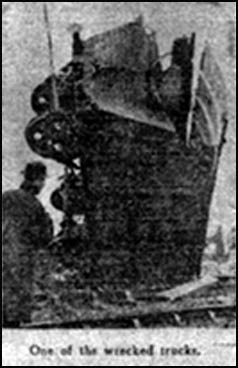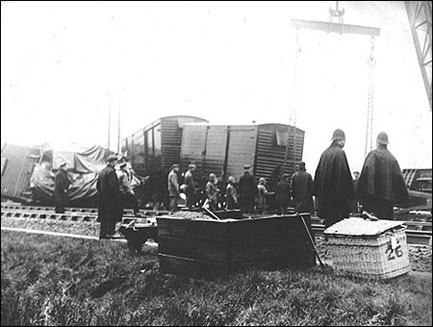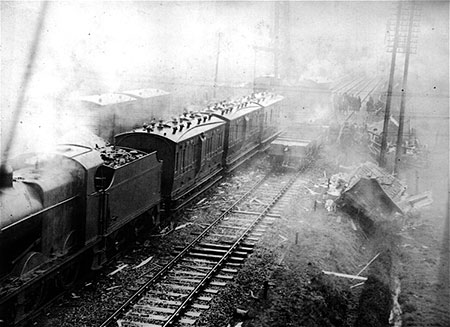 |
| MAIN LINE BLOCKED -COLLISION NARROWLY AVERTED - TRUCKS WRECKED |
Three lines on the L.M.S. Railway at Burton Latimer near Kettering were blocked early today by the derailment of part of a Derby-London fast freight train. No-one was injured.
While going down the slope to Burton Latimer station, the 8.50 pm train from Derby became divided, the rear portion overtook and crashed into the first part. Several trucks were smashed and the contents, general goods, were strewn about the track. A much more serious accident was averted by the promptness of the train crew in warning another fast goods train, which was also London-bound, and would have overtaken the Derby train. The second train was pulled up, near the wreckage, with a narrow margin to spare, and was later diverted to another line, as were other trains. Breakdown gangs worked through the night to clear the lines, and by eight-o-clock this morning trains were running normally through Kettering to London. All three lines were cleared by noon today.
Derby Daily Telegraph - Thursday 26 March 1936
|
|
|
Although the derailment of the goods train caused no injuries at the time, a year later its guard, Walter Dorrell of Derby, sued the L.M.S. under the Workmen's Compensation Act for injuries caused when the train left the rails. The guard's version of the accident was described in the Derby Daily Telegraph in March 1937: Dorrell said that he was aged 42 and his wage had been £3 5s. a week. He was the guard of a train, which left Derby at 8.53 p.m for London. As the train approached Burton Latimer 54 wagons, in one of which he was travelling, became detached from the front of the train. The driver stopped the engine, the rear wagons ran into the front wagons, and 17 were derailed.
He was with a guard named Hardy, and, before the impact he noticed a red light signal from a signal-box. Dorrell, conscious of the approaching collision, gripped the wheel of his brake, and he claimed that as the result of the impact he was violently thrown about. He was certainly jerked and jolted, and struck his head against the brake.
He alighted and gave instructions to the fireman, as he understood that an express goods train was approaching from London. The express was able to slow down before it reached the train. He became so exhausted that he could not speak for a little while. He carried on with his work from the time of the accident until April 28, but during that time he suffered from headaches, sleeplessness, and stiffness in his neck............
The court was told that at a later date, Dorrell was cycling when, in his own words "everything went black" . He crashed into an island and was admitted to the Derbyshire Royal Infirmary. Afterwards he became totally blind in the left eye.
John Hardy, the guard travelling with Dorrell, said that neither of them was thrown against the side of the van at the time of the impact. Other witnesses gave evidence that Dorrell did not appear to have been hurt by the impact.
Judge E.H. Longson reserved his judgement. However, at a later hearing reported in the same newpaper on Wednesday 21 April 1937, he said that he had come to the conclusion that Dorrell's blindness was due to the injuries received by him while following his employment. He awarded him compensation of 8s. 6d. per week.
|


